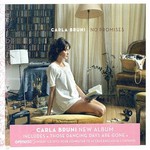No Promises
Studio Album by Carla Bruni released in 2007No Promises review
Carla Bruni – an example of never-fading popularity
Carla Bruni is known not only for musical accomplishments. She has already had time to taste the fame as one of the most expensive top models and at the same time she was an often tabloid heroine owing to her romantic affairs with Mick Jagger, Eric Clapton, Kevin Costner and not really creative person Donald Trump. It may seem to someone that a selection of such celebrities speaks about purely mercantile interests of Carla Bruni, but this would be a wrong supposition, in addition to all her merits Carla Bruni is also a rich heiress therefore money is by no means the first thing from the list of problems that bother her. But the thing that really stirs her up is the music. Five years that have passed since her first extremely popular album Quelqu'un M'a Dit were not spent in vain. Carla was successfully working as a songwriter and lyricist for the certain French performers. She has also taken part in compilation albums and has recorded duos with Jean-Louis Murat and Aldo Romano. In short Carla Bruni gave a good account of herself and proved to be a talented performer and composer. This year she decided to turn her attention back to her career at last and this fact can’t help making admirers of her debut album feel glad, especially those who understands English speech. This time around she applied herself to the legacy of English and American poets and performed all the 11 songs of her new album No Promises in English.
The lyrics for No Promises was borrowed from classic poets
That’s how Carla commented on her choice of English poems during on of her interviews: “…I find English and American poetry very hypnotic… the poets on my album tackled very modern themes in their work, especially the women whose poetry can be really hardhitting at times”. Indeed, the selection of lyrics on the album is realy brght. The poems of such authors like Emily Dickinson or William Yeats are soaked with the atmosphere of romantism and melancholy. Carla Bruni tried her best not to lose the sensitity of these writings. The basis of the songs lies in her voice – elegant and a little bit husky, it sounds as if she is standing right next to your ear. There are no luod songs and acute sounds here. The music rests on aocoustic guitar, sometimes it is accompanied by a rhythm section, harmonica or cello. A friendly song I felt My Life With Both My Hands may serve as the demostrating example of a measured vocal melody and beatiful bluiesy guitar union. On Those Dancing Days Are Gone Carla sings so calmly and leisurely that at times her voise almost gets down to a wisper. One of the most lively and rocking songs of the album is If You Were Coming In the Fall. In order to emphisize the song’s rythmical basis, the arrangement was enreached with intrigue vocal immitation of maracas during a calm full intro, but as early as the first chorus begins the band starts playing in it’s full capacity.
Carla Bruni stays devoted to the French songwriting tradition
Stylistically No Promises doesn’t differ a lot form Carla Bruni’s first album. Just like before her music proceeds from the melodies that are rooted in French chanson and gets diluted with bluesy intonations, but at this time a big attention was paid to arrangements, particularly to the guitar’s parties that beautifully interlace with each other, supplement and enrich a general sounding of the album. No Promises will definitely recommence a withering interest to Carla Bruni outside the French boarders not only because it became possible for many listeners to understand the words she is singing but also because her album is a really rare thing in the modern pop, a mix of simple and beautiful music with classic lyrics is not an everyday issue. As a rule a performer who apply him or her self to incarnate such a project takes a huge responsibility as he poses him self to be a peculiar designer for the masterpieces belonging to the classics of world literature and takes a co-author position with the acknowledged poets. This is a pretty slippery path and it is easy to take a false step here. But Carla Bruni walks it gorgeously; her final work may deserve praises even from the specialists in study of literature. If you still haven’t had a chance to meet the art works of this Franco-Italian singer then No Promises will be the most appropriate album for doing this.

